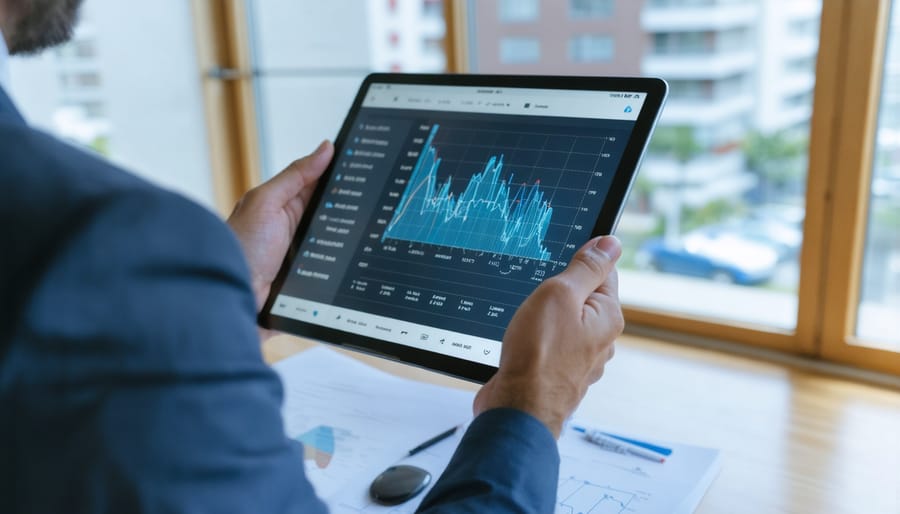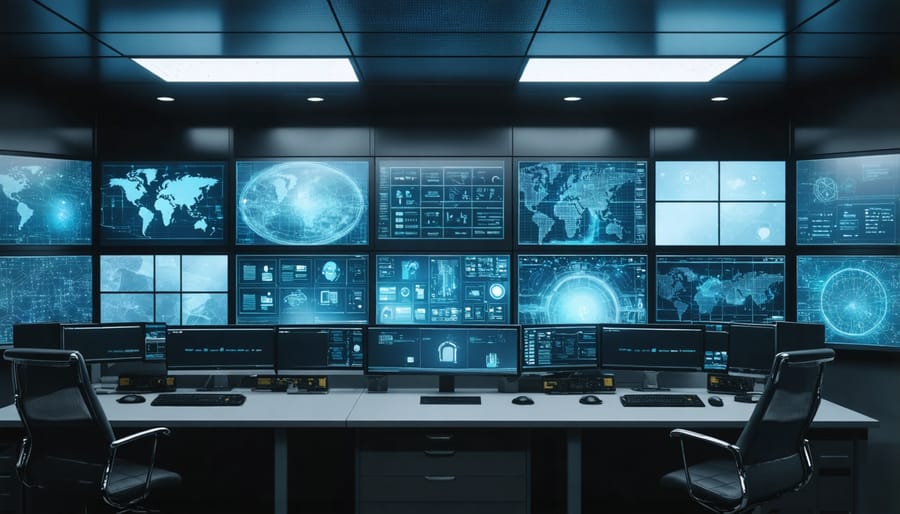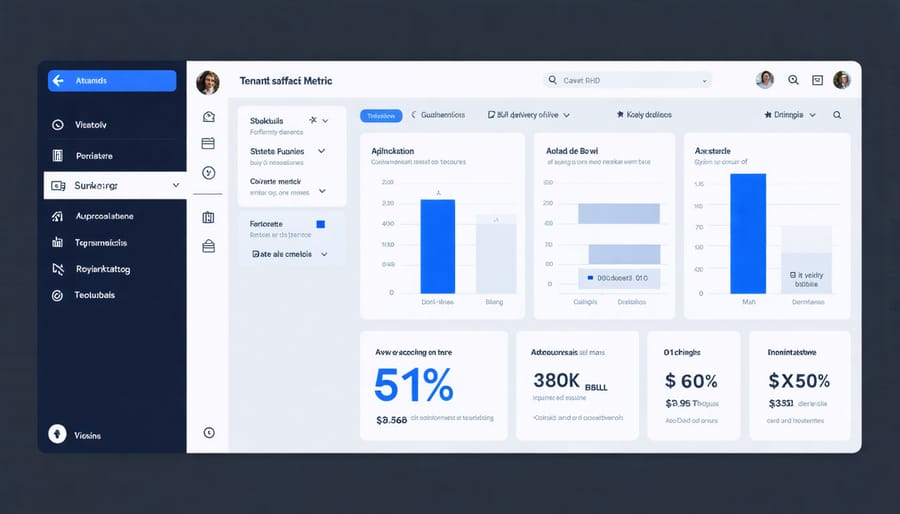Property managers today must master a complex ecosystem of responsibilities that extends far beyond basic building maintenance. Operating at the intersection of real estate operations, financial management, and customer service, successful property managers transform tenant experience through strategic oversight and proactive management.
Modern property management demands expertise in regulatory compliance, technological integration, and sustainable operations while maintaining optimal occupancy rates and maximizing asset value. The role requires orchestrating multiple stakeholders – from maintenance teams and vendors to tenants and property owners – while ensuring properties remain competitive in an evolving market landscape.
Industry standards now expect property managers to deliver data-driven results, implement sophisticated property management systems, and develop comprehensive risk management strategies. This elevated approach combines traditional property oversight with advanced business acumen, creating a framework for sustainable property performance and tenant satisfaction.
These evolving expectations reflect the profession’s transformation from basic administrative functions to strategic asset management, requiring professionals who can balance operational excellence with long-term value creation for property owners and investors.
Core Responsibilities in Tenant Communication
Responsive Communication Protocols
A property manager must establish and maintain clear communication protocols that align with industry standards and tenant expectations. Response times should follow a tiered system: emergency maintenance issues require immediate attention within 1-2 hours, urgent matters within 24 hours, and routine requests within 48-72 hours. This systematic approach ensures efficient issue resolution while prioritizing critical situations.
Successful property managers implement multiple communication channels to accommodate diverse tenant preferences. These typically include a dedicated property management software platform, email support, phone lines, and a mobile app for convenient issue reporting. Regular office hours should be clearly communicated, along with emergency contact procedures for after-hours situations.
Documentation of all communications is essential for liability protection and performance tracking. Managers should maintain detailed logs of tenant interactions, including timestamps, response times, and resolution details. Automated acknowledgment systems help manage tenant expectations while ensuring no communication falls through the cracks.
Property managers should also establish regular check-ins with tenants through quarterly newsletters, building updates, and annual satisfaction surveys. This proactive approach helps identify potential issues before they escalate and demonstrates commitment to tenant satisfaction. Regular communication audits ensure protocols remain effective and adapt to changing tenant needs.
Digital Platform Integration
Modern property managers must effectively integrate digital platforms to streamline operations and enhance tenant satisfaction. A comprehensive property management software system serves as the cornerstone of digital operations, enabling automated rent collection, maintenance request tracking, and financial reporting. These platforms typically include secure tenant portals where residents can submit maintenance requests, pay rent, and access important documents 24/7.
Communication tools such as automated email systems and mobile apps have become essential for maintaining consistent contact with tenants. Property managers should implement messaging systems that allow for mass notifications about building maintenance, emergency alerts, or community updates while maintaining detailed communication logs for future reference.
Document management systems are crucial for storing and organizing leases, inspection reports, and maintenance records digitally. Cloud-based solutions ensure that critical information is accessible to authorized personnel from any location while maintaining data security protocols.
Analytics and reporting features within these platforms help property managers track key performance indicators, monitor occupancy rates, and analyze maintenance costs. Integration with accounting software streamlines financial operations, ensuring accurate record-keeping and simplified tax preparation. The adoption of these digital solutions demonstrates a property manager’s commitment to efficiency and modern service delivery standards.

Maintenance and Facility Management Excellence
Preventive Maintenance Programs
A well-structured preventive maintenance program forms the cornerstone of effective property management, helping to extend asset life and reduce unexpected repair costs. Property managers must develop and implement comprehensive maintenance schedules that address both routine inspections and systematic upgrades of building systems.
The program should encompass regular checks of HVAC systems, electrical infrastructure, plumbing networks, and structural components. Scheduling these inspections at predetermined intervals ensures consistent monitoring and helps identify potential issues before they escalate into major problems. Property managers typically maintain detailed documentation of all maintenance activities, including inspection reports, service records, and repair histories.
Critical components of an effective preventive maintenance program include:
– Quarterly HVAC system inspections and filter replacements
– Annual roof and building envelope assessments
– Monthly fire safety system testing
– Regular elevator maintenance and certification
– Seasonal landscaping and exterior maintenance
– Periodic review of building automation systems
Modern property managers increasingly utilize computerized maintenance management systems (CMMS) to track maintenance schedules, generate work orders, and analyze maintenance costs. This data-driven approach enables better resource allocation and helps justify maintenance budgets to property owners.
The implementation of green maintenance practices and energy-efficient upgrades should also be integrated into the preventive maintenance strategy, ensuring both environmental responsibility and cost effectiveness in building operations.
Emergency Response Systems
A property manager must establish and maintain robust emergency response protocols to address urgent maintenance issues promptly and effectively. This includes implementing a 24/7 emergency contact system, maintaining relationships with reliable emergency service contractors, and developing clear escalation procedures for different types of emergencies.
The emergency response framework should categorize issues based on severity and required response times. Priority-one emergencies, such as flooding, fire damage, or complete HVAC failure, require immediate response within 1-2 hours. Secondary emergencies, like partial power outages or minor plumbing issues, typically warrant a 4-6 hour response window.
Essential components of an effective emergency response system include:
– A dedicated emergency hotline or digital reporting system
– Pre-approved vendor contracts for emergency services
– Documented emergency procedures and checklists
– Regular staff training on emergency protocols
– Backup systems for critical building functions
– Clear communication channels with tenants and stakeholders
Property managers should regularly review and update these systems, incorporating lessons learned from previous incidents. This includes maintaining detailed incident reports, conducting post-emergency assessments, and updating response procedures accordingly. Emergency drills and system tests should be scheduled quarterly to ensure all components function as intended and staff remain prepared for various scenarios.
Regular maintenance inspections and preventive measures can help reduce emergency incidents, but preparation for unexpected situations remains crucial for effective property management.
Safety and Security Standards
Access Control Management
In today’s digital age, property managers must implement comprehensive access control systems that integrate both physical and digital security measures. Modern access management requires a sophisticated approach to protecting assets, residents, and sensitive information through advanced technology and robust security protocols.
Property managers are expected to oversee the installation and maintenance of electronic key card systems, biometric scanners, and surveillance equipment. This includes managing credential issuance, monitoring access logs, and regularly updating authorization levels for different areas within the property. The implementation of visitor management systems, including digital sign-in procedures and temporary access protocols, has become standard practice.
Critical responsibilities include:
– Maintaining detailed access records and audit trails
– Coordinating with security personnel and monitoring services
– Ensuring compliance with privacy regulations and industry standards
– Implementing emergency override procedures
– Regular testing and upgrading of security systems
Property managers must also develop contingency plans for system failures and security breaches, ensuring continuous protection of the property and its occupants. Regular security assessments and updates to access control policies help maintain the highest levels of protection while balancing convenience for authorized users.

Safety Compliance Updates
Property managers must maintain rigorous safety compliance protocols to protect tenants, visitors, and property assets while adhering to local, state, and federal regulations. This includes conducting regular safety inspections of common areas, emergency systems, and building infrastructure to identify and address potential hazards proactively.
Key safety compliance responsibilities include monthly fire system testing, quarterly emergency lighting checks, and bi-annual inspection of life safety equipment. Property managers must ensure all emergency exits remain unobstructed, fire extinguishers are properly maintained, and evacuation plans are clearly posted and updated.
Documentation plays a crucial role in safety compliance. Managers must maintain detailed records of all inspections, maintenance activities, and incident reports. These records should be readily accessible during regulatory audits and may be required for insurance purposes.
Environmental safety considerations require monitoring indoor air quality, implementing proper ventilation maintenance, and ensuring compliance with hazardous material handling protocols. Regular assessment of building systems for potential health risks, such as legionella testing in water systems or asbestos monitoring in older buildings, is essential.
Property managers should also establish clear communication channels with emergency services and maintain updated emergency response procedures. Regular staff training on safety protocols and emergency procedures ensures consistent implementation of safety measures across the property.

Tenant Satisfaction Metrics
Key Performance Indicators
Effective property managers rely on established performance measurement standards to evaluate tenant satisfaction and operational efficiency. Key metrics include tenant retention rate, which should ideally exceed 80%, and response time to maintenance requests, targeting resolution within 24-48 hours for non-emergency issues. Regular tenant satisfaction surveys, conducted quarterly or bi-annually, should maintain a minimum satisfaction score of 85%.
Additional critical indicators include vacancy rates, aiming to keep them below market average, and lease renewal rates targeting 70% or higher. The average time to fill vacant units should not exceed 30 days, while maintenance cost per square foot should align with industry benchmarks for the property type and location.
Emergency response effectiveness is measured through documented response times, with a target of under 60 minutes for critical issues. Financial metrics such as rent collection efficiency (targeting 98% or higher) and operating expense ratio (typically 30-40% of gross operating income) provide crucial insights into property performance. These KPIs should be monitored monthly and reviewed quarterly to ensure optimal property management outcomes.
Feedback Implementation Systems
A robust feedback implementation system is essential for effective property management. Professional property managers should establish multiple channels for tenant feedback collection, including digital surveys, mobile apps, and traditional suggestion boxes. Regular tenant satisfaction surveys should be conducted quarterly, focusing on key areas such as maintenance response times, facility conditions, and communication effectiveness.
Implementation of a structured feedback loop ensures that tenant concerns are addressed systematically. This includes acknowledging feedback within 24 hours, categorizing issues by priority, and maintaining a transparent tracking system for resolution progress. Property managers should utilize property management software to document and analyze feedback patterns, enabling data-driven decisions for property improvements.
Regular tenant meetings and focus groups provide valuable qualitative insights that complement quantitative data. The feedback gathered should directly influence property maintenance schedules, capital improvement plans, and service delivery modifications. Successful property managers also maintain a feedback dashboard that tracks resolution rates, response times, and tenant satisfaction metrics, ensuring accountability and continuous service improvement.
Best practices include establishing clear escalation protocols for critical issues, providing regular updates to stakeholders, and conducting annual reviews of the feedback system’s effectiveness. This comprehensive approach helps maintain high tenant satisfaction levels while optimizing property performance.
Technology Integration Requirements
In today’s digital age, property managers must effectively integrate and leverage modern technological tools to streamline operations and enhance tenant satisfaction. Essential technology requirements include implementing a comprehensive property management software system that integrates accounting, maintenance tracking, and tenant communication functionalities.
Cloud-based platforms have become industry standard, enabling remote access to critical data and facilitating seamless collaboration among team members. Property managers must maintain proficiency in building automation systems (BAS) that control HVAC, lighting, and security systems. Smart building technologies, including IoT sensors for preventive maintenance and energy management, require regular monitoring and optimization.
Digital payment processing systems and online tenant portals are non-negotiable components of modern property management. These systems should facilitate automated rent collection, maintenance requests, and document management while ensuring compliance with data security regulations.
Security technology integration demands expertise in access control systems, surveillance equipment, and visitor management platforms. Property managers must also maintain digital documentation systems for compliance records, insurance certificates, and maintenance histories.
Mobile applications for both staff and tenants have become essential tools for real-time communication and service delivery. Property managers should implement and maintain these systems while ensuring proper staff training and technical support. Additionally, they must stay current with emerging technologies and evaluate their potential impact on operational efficiency and tenant experience, making strategic recommendations for technology investments that align with property objectives.
In today’s rapidly evolving real estate landscape, property managers must continuously adapt to meet rising expectations while maintaining core operational excellence. The role has transformed from basic maintenance oversight to a complex, multi-faceted position requiring expertise in technology integration, sustainability practices, and enhanced customer service delivery.
Looking ahead, successful property managers will need to embrace artificial intelligence and automation tools for streamlined operations, while maintaining the human touch that tenants value. The emphasis on sustainable building practices and energy efficiency will continue to grow, making environmental stewardship an essential skill set.
Data analytics and predictive maintenance will become increasingly crucial for property managers to optimize building performance and reduce operational costs. Additionally, the rise of remote work and flexible spaces demands adaptive management strategies and innovative amenity offerings.
The future of property management lies in balancing traditional responsibilities with emerging technologies and evolving tenant needs. Those who successfully integrate these elements while maintaining professional standards and regulatory compliance will set the benchmark for excellence in the industry. Property managers must remain committed to continuous learning and professional development to stay ahead of industry trends and exceed stakeholder expectations.

